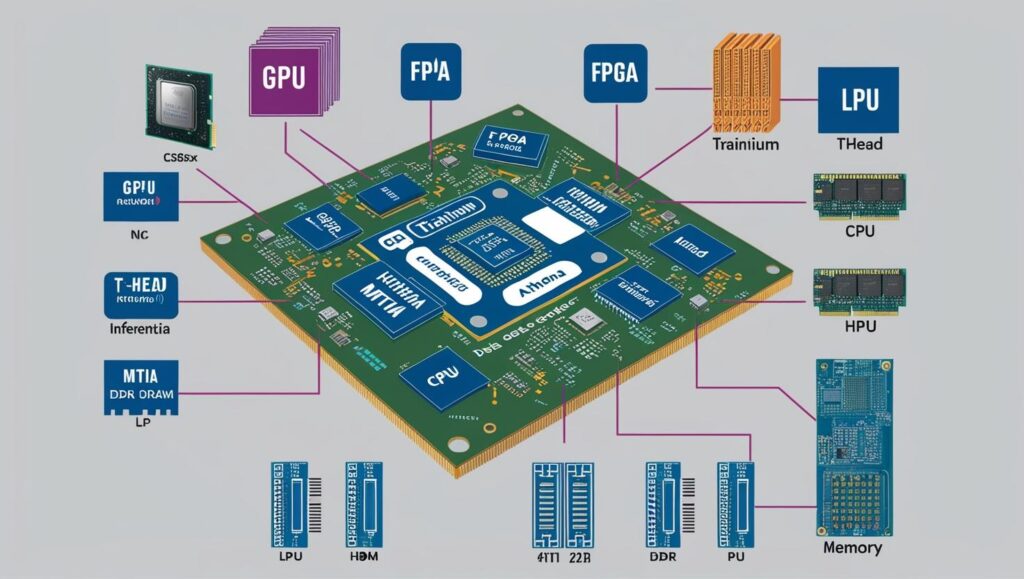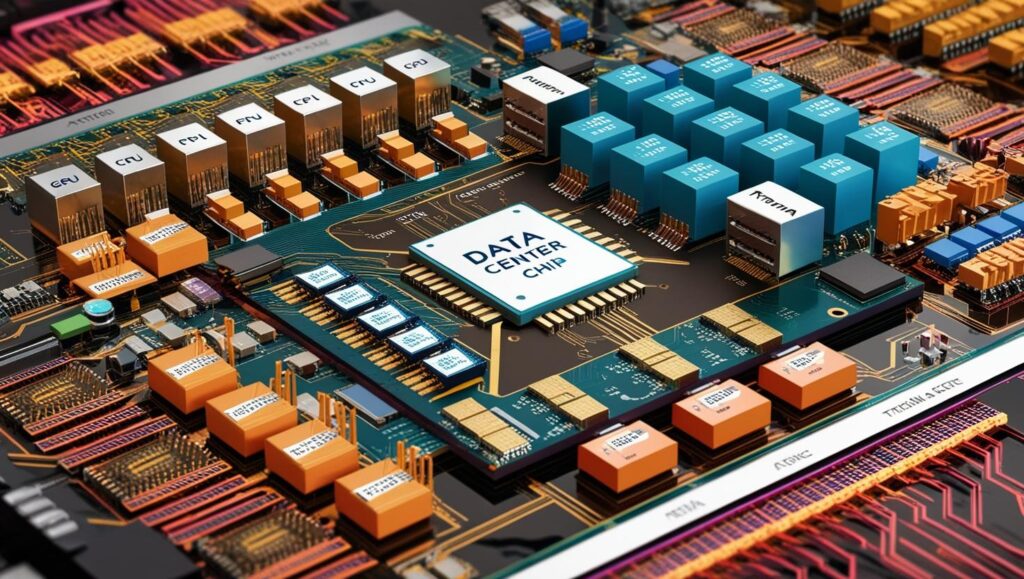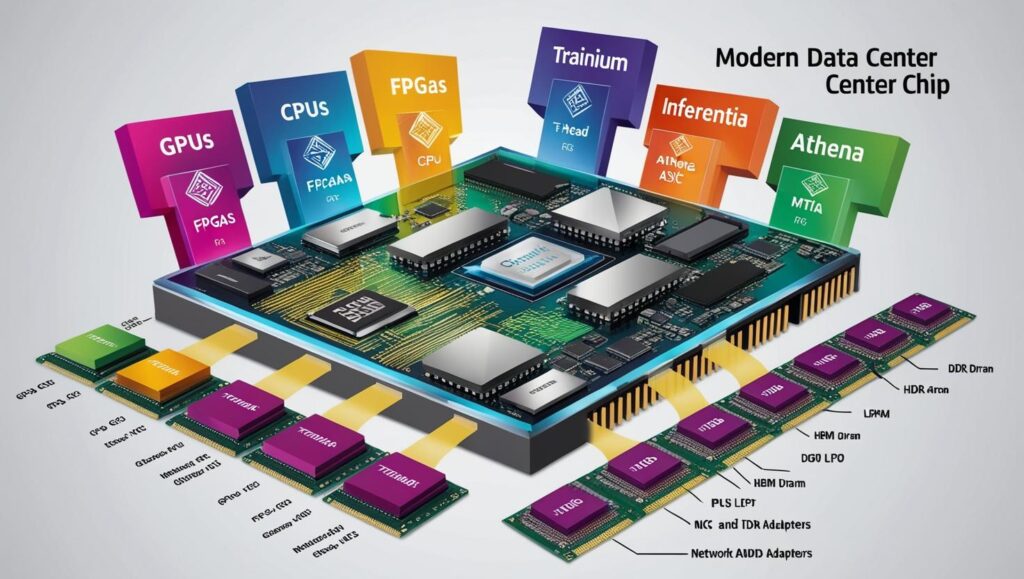In the ever-evolving world of computing, artificial intelligence (AI) has emerged as a transformative force that is reshaping industries, driving innovation, and enabling the next frontier of technological advancements. At the heart of AI’s rapid growth is high-performance computing (HPC), which relies heavily on sophisticated hardware to process massive amounts of data at incredible speeds. Central to this evolution are AI data center chips—specialized processors designed to accelerate AI workloads and support the growing demand for data processing power.
As organizations continue to harness the potential of AI, from machine learning (ML) to deep learning (DL) and natural language processing (NLP), the need for efficient, powerful, and scalable hardware solutions has never been more crucial. AI data center chips are emerging as the backbone of this transformation, unlocking the capabilities required for the modern digital landscape.
Understanding AI Data Center Chips
AI data center chips are specialized processors designed to handle the complex computations necessary for running AI algorithms. Unlike traditional general-purpose processors, such as CPUs, AI chips are optimized to accelerate specific AI tasks like matrix multiplication, neural network processing, and parallel computations. These chips come in various forms, including Graphics Processing Units (GPUs), Application-Specific Integrated Circuits (ASICs), and Field-Programmable Gate Arrays (FPGAs). Each type offers distinct advantages depending on the application.
GPUs: Originally designed for rendering graphics, GPUs are now central to AI computations due to their ability to perform parallel processing efficiently, making them ideal for training and running large-scale neural networks.
ASICs: These chips are custom-designed for specific tasks, such as Google’s Tensor Processing Units (TPUs), and offer the best performance and efficiency for particular AI workloads.
FPGAs: These programmable chips allow for flexible hardware configurations, offering a balance between performance and adaptability, making them suitable for AI applications that require quick customization.
The data center chip market is expected to grow from USD 206.96 billion in 2025 and is projected to reach USD 390.65 billion by 2030, growing at a CAGR of 13.5% from 2025 to 2030.
Download PDF Brochure @ https://www.marketsandmarkets.com/pdfdownloadNew.asp?id=39999570

Growth Drivers of the AI Data Center Chip Market
The demand for AI data center chips has surged in recent years, fueled by several factors that are propelling the adoption of AI technologies across industries. Some of the primary growth drivers include:
1. Explosive Growth of AI and Machine Learning
AI has become integral to a variety of sectors, including healthcare, finance, automotive, and retail. From self-driving cars and voice assistants to predictive analytics and personalized marketing, AI applications are transforming business operations. To support these innovations, businesses require powerful computing infrastructure, which AI data center chips provide. As AI algorithms become more sophisticated and data sets larger, the need for advanced hardware that can handle these complex computations efficiently is driving the market for AI chips.
2. Increasing Demand for Data Processing Power
The explosive growth of data in the digital age has created an insatiable demand for processing power. The rise of the Internet of Things (IoT), 5G networks, and cloud computing has significantly increased data traffic, requiring robust data centers that can process and analyze this data in real-time. AI data center chips are specifically designed to handle the vast amounts of data generated by these technologies, making them essential for modern data centers.
3. Advancements in Cloud Computing and Edge Computing
Cloud providers and edge computing solutions are heavily reliant on AI to manage, store, and process data. Cloud platforms such as Amazon Web Services (AWS), Microsoft Azure, and Google Cloud are investing heavily in AI infrastructure to support a wide range of services, including AI-as-a-Service, machine learning model deployment, and data analytics. AI chips are central to these offerings, as they enable high-performance computing capabilities that are critical for cloud-based AI applications.
In addition to cloud computing, edge computing is gaining momentum, particularly in industries like autonomous driving and IoT. Here, AI data center chips enable real-time processing at the edge, reducing latency and ensuring fast, efficient decision-making.
4. Energy Efficiency and Performance Demands
With the increase in AI workloads, the need for energy-efficient processing solutions has become more apparent. Traditional CPUs are not optimized for AI tasks and can be energy-hungry when processing large datasets. AI data center chips, particularly GPUs, ASICs, and FPGAs, are designed with greater energy efficiency in mind, offering a higher performance-to-power ratio. These chips help reduce power consumption while delivering the computational power required to process AI workloads, making them an attractive option for data centers looking to optimize their energy consumption.
5. Expansion of AI Research and Development
Academic institutions and research organizations are also driving demand for AI data center chips. AI research, especially in deep learning and reinforcement learning, requires high-performance computing resources to process large datasets and perform complex simulations. The increasing investment in AI research and development (R&D) is accelerating the need for advanced hardware solutions that can support these activities.

Key Trends in the AI Data Center Chip Market
As the AI data center chip industry continues to grow, several key trends are shaping its evolution:
1. AI Chip Specialization
We are witnessing a growing trend of specialization within the AI chip market. Companies like Google, Amazon, and Microsoft are developing their own custom-designed AI chips to optimize performance for their specific AI workloads. These specialized chips allow companies to gain a competitive edge by optimizing their hardware for specific applications, leading to faster processing speeds, greater energy efficiency, and improved overall performance.
2. Integration of AI Chips with Data Center Infrastructure
AI data center chips are becoming more integrated with other aspects of data center infrastructure, such as storage, networking, and power management. This integration allows for more efficient utilization of resources, reducing the need for redundant hardware and optimizing the overall performance of data centers. The increasing adoption of AI-driven data center management is helping organizations to further improve performance, scalability, and energy efficiency.
3. AI Chip Innovations for Edge Applications
The shift toward edge computing is driving innovation in AI chip design, with a focus on chips that can deliver high-performance computing at the edge. Edge AI chips need to balance high performance with low power consumption, as they are often deployed in mobile devices, autonomous vehicles, and industrial IoT applications. Companies are investing in more powerful yet energy-efficient chips designed to process data in real-time at the edge, reducing the need for centralized cloud processing.
4. Adoption of AI as a Service (AIaaS)
AI as a Service (AIaaS) is gaining momentum, as businesses seek to leverage AI capabilities without having to build their own AI infrastructure. AI data center chips are central to these offerings, enabling cloud providers to deliver high-performance AI solutions to enterprises. This trend is likely to drive further adoption of AI chips, as businesses increasingly look to outsource AI workloads to the cloud.

The Future Outlook
The AI data center chip market is poised for continued growth, driven by increasing AI adoption, the growing demand for high-performance computing, and the rise of cloud and edge computing. As AI technologies continue to advance and evolve, so too will the demand for more powerful, energy-efficient, and specialized AI chips.
In the coming years, we can expect further innovations in chip design, with new solutions that cater to emerging AI workloads, such as deep learning, reinforcement learning, and natural language processing. The growth of the AI data center chip market will be fueled by the convergence of advancements in AI, big data, cloud computing, and edge technologies—ushering in a new era of high-performance computing.
AI data center chips are powering the future of high-performance computing, providing the necessary infrastructure to support the AI-driven transformation across industries. With advancements in chip design, energy efficiency, and AI-specific optimizations, these chips are playing a crucial role in enabling the next generation of AI technologies. As the demand for AI-driven applications continues to grow, AI data center chips will remain at the heart of this digital revolution, accelerating innovation and driving the future of computing.
About MarketsandMarkets™
MarketsandMarkets™ is a blue ocean alternative in growth consulting and program management, leveraging a man-machine offering to drive supernormal growth for progressive organizations in the B2B space. We have the widest lens on emerging technologies, making us proficient in co-creating supernormal growth for clients.
The B2B economy is witnessing the emergence of $25 trillion of new revenue streams that are substituting existing revenue streams in this decade alone. We work with clients on growth programs, helping them monetize this $25 trillion opportunity through our service lines – TAM Expansion, Go-to-Market (GTM) Strategy to Execution, Market Share Gain, Account Enablement, and Thought Leadership Marketing.
Built on the ’GIVE Growth’ principle, we work with several Forbes Global 2000 B2B companies – helping them stay relevant in a disruptive ecosystem. Our insights and strategies are molded by our industry experts, cutting-edge AI-powered Market Intelligence Cloud, and years of research. The KnowledgeStore™ (our Market Intelligence Cloud) integrates our research, facilitates an analysis of interconnections through a set of applications, helping clients look at the entire ecosystem and understand the revenue shifts happening in their industry.
To find out more, visit www.MarketsandMarkets™.com or follow us on Twitter, LinkedIn and Facebook.
Contact:
Mr. Rohan Salgarkar
MarketsandMarkets™ INC.
1615 South Congress Ave.
Suite 103
Delray Beach, FL 33445
USA : 1-888-600-6441